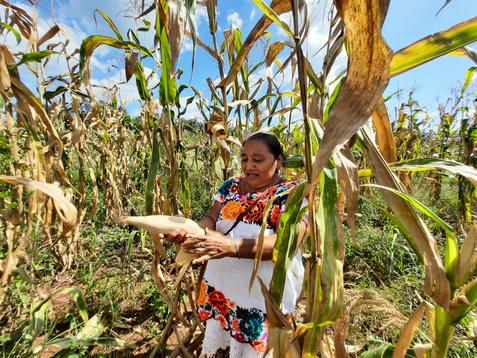Just transition in Yucatán
Yucatán is at a pivotal moment in its development and faces a series of environmental and social challenges. Ensuring a just transition to a more sustainable and equitable economy is fundamental to addressing these challenges while building a better future for local people.
One of the main concerns is developing resilience to climate change, so identifying specific climate vulnerabilities has been crucial. We expect three main issues to affect our state in the coming years:
In the most favourable scenario there will be a slight increase in precipitation, while in the most pessimistic scenario there will be a gradual decrease to 19.9% below the 1981-2010 period;
- Temperatures are likely to increase gradually, ranging from from 0.9 to 1.3ºC in the most favourable scenario to 1.0 to 4.0ºC in the most pessimistic scenario;
- Coastal zones throughout the state will generally see a rise in sea water levels, from the Ría Celestún Biosphere Reserve to the Ría Lagartos Natural Park.
- According to the Watershed and Climate Change Platform, all projections point to future temperature increases at all altitudinal levels in Yucatán. This threatens to compromise environmental services and shows why the state needs to assume additional climate commitments, above and beyond those made by our national government.
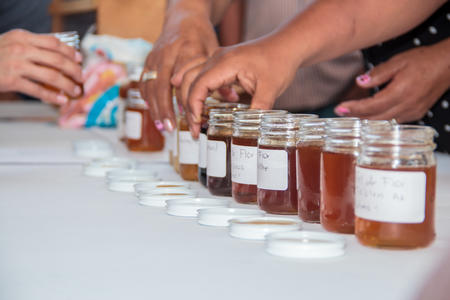
Benefits of a just transition
Yucatán realizes the various benefits that Just Transition represents. For people, it means green jobs, improvements in quality of life, reduced poverty and inequality and an increase in local opportunities. For the environment, it can help to protect natural resources, reduce greenhouse gas emissions and promote sustainability through the adoption of sustainable practices in agriculture, industry and tourism.
For a just transition in Yucatán, we must involve all sectors of society, from governments to businesses, civil society and local communities. We have therefore developed a comprehensive strategy to plan the state’s future climate action: the Yucatán State Special Program for Climate Change (2023). This covers areas such as investment in human and financial resources (including education), capacity building, research and innovation and international cooperation to share experiences and best practices.
Why should governments care about just transition?
Governments have a responsibility to establish the right frameworks to take the climate action needed. But this alone is not enough. We also have to consider communities within their local contexts to understand the solutions that will bring them along with us and ensure these frameworks meet their needs. A just transition places people at its heart. So when we build local resilience to climate change, it’s essential we do so both in and with communities.
The Government of Yucatán’s role involves:
- Establishing a suitable regulatory framework: the policies and regulations that incentivize investment in green sectors, safeguard environmental protections and create decent jobs..
- Directing public investment towards green infrastructure and innovation, as well as education and training programs that support the transition.
- Facilitating cooperation between different key actors, such as the private sector, civil society and local communities.
- Planning and leading transition planning and coordination at the regional level.
Supporting Yucatán’s REDD+ Strategy
As part of the Governors Group for Climate and Forests (GCF Task Force), public-private financing schemes (windows) were developed to support a State REDD+ Strategy (EEREDD+) in Yucatán.
This project, managed by the World Wildlife Fund (WWF) and the Intermunicipal Biocultural Board of Puuc (JIBIOPUUC) and financed by the Government of Norway, UNDP, GCF-Mexico and Pronatura Sur, aimed to promote low-emission rural development such as sustainable entrepreneurship in Mayan milpa practice, beekeeping, horticulture gardening, bioculture and innovative payment methods for Environmental Services (PES).
Financing Window A:
Financing Window A supported GCF Task Force members, including Yucatán, in designing jurisdictional strategies through on-site diagnostics and pilot testing of initiatives to generate REDD+ Investment plans. These plans help to reduce GHG emissions by integrating conservation and biodiversity improvements in collaboration with local communities.
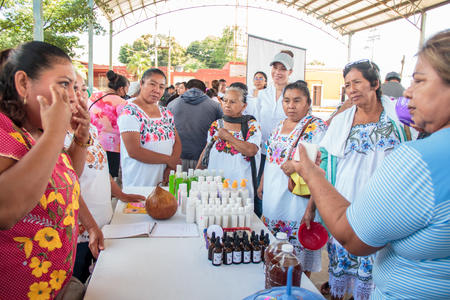
The Government of Yucatán used this opportunity to identify areas that would reflect the need for climate change resilience while being sustainable in the long term. This meant strengthening local organizational structures and sharing information across different levels of governments to ensure the initiatives would achieve the strong results we knew they could.
Financing Window B
Financing Window B allowed us to develop schemes that would strengthen the capacities of local communities that depend on forest resources and environmental services for their livelihoods. These schemes, implemented through strong partnerships, aimed to support sustainable land and rural production management, through community-based activities that maintain environmental services and traditional management practices to reduce deforestation and forest degradation. They also enabled the implementation of low-emission, rural development policy in eight southern municipalities: Muna, Santa Elena, Ticul, Oxkutzcab, Tekax, Tzucabcab, Peto and Yaxcabá.
Collaboration, communities, conservation
Overall, the project has helped to promote sustainability and align agricultural and forestry sectors to create strong value chains in the Mayan milpa practice and beekeeping-meliponiculture. It also served to protect and conserve grazing areas with high forest value, encourage productive restoration of the area and support the 2023 update of Yucatán’s REDD+ strategy.
The project also promoted the conservation of forest ecosystems through a Payment for Environmental Services program (made up of state and federal funds) and other local mechanisms, such as the promotion of Areas Voluntarily Designated for Conservation (ADVC). These aim to protect and expand carbon reservoirs in the Emission Reduction Initiative (ERI) region of Yucatán, with social and environmental co-benefits linked to food security, agrobiodiversity and local biodiversity conservation.
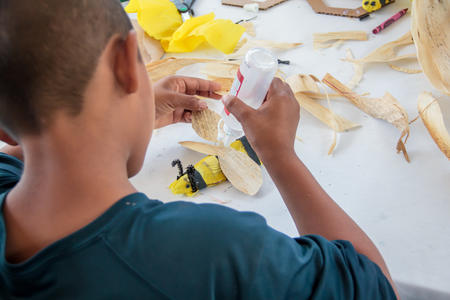
Importantly we actively involved vulnerable groups such as women, youth and indigenous communities to ensure all people were represented and could benefit. We did this through:
- Consolidating institutional arrangements and agreements for the sustainable development and strengthening of maize and honey value chains.
- Promoting the sustainable production of Mayan Milpa and honey.
- Strengthening the value chains involved in Mayan Milpa and honey production.
- Strengthening municipal capacities for sustainable rural development.
- Conserving biodiversity in the Puuc Biocultural State Reserve and other key areas.
- Implementing a strong Monitoring, Reporting and Verification (MRV) system.
Results
The project ran from July 2021 to June 2023 and involved partnerships with other state and federal ministries, municipal authorities, non-governmental agencies and academic institutions as well as local and indigenous communities and producers. It sought to align sustainable rural development with forest ecosystem conservation policies to promote sustainable development initiatives.
After two years:
- 6,500 hectares of forests had been conserved under the Payments for Environmental Services scheme through public-private funding with the participation of 12 ejidos.
- 1,413 hectares of milpa practice were implemented in the eight working municipalities, with technical collaboration from institutions such as the Universidad Autónoma de Yucatán.
- 99 producers qualified for the EC031 Competency standard for strengthening bee colonies and 57 producers gained organic certification from the EDUCE Cooperative.
- A regional brand ("Puuc Origin") was developed to promote products originating from the region.
- Six municipalities (Muna, Ticul, Peto, Tekax, Tzucacab, Oxkutzcab) were certified for best practice by the National Institute for Federalism and Municipal Development.
- Four ejidos in the region began the process to certify their land as Areas Voluntarily Designated for Conservation (ADVC), covering an area of 8,621.05 hectares.
- A forest cover monitoring analysis conducted between 2020 and 2022 suggested forest cover in the region had been maintained and had possible increased.
Successes, challenges and next steps
One of the main challenges for this project was formally agreeing alliances as well as building and strengthening local governance procedures. However, we overcame these through activities and workshops that defined steps to be taken while ensuring continuity for local people.
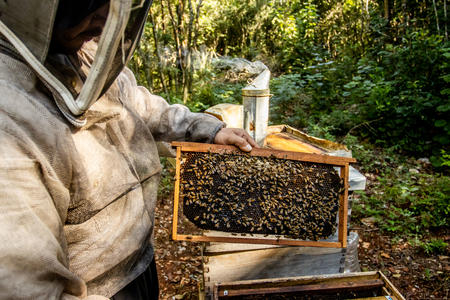
Another significant challenge was to achieve the effective and visible participation of women, especially in activities predominantly led by men, such as milpa and beekeeping. To address this, we created specific spaces for play activities with boys and girls, workshops were held with male and female producers on the importance of women's participation and leadership, and exclusive spaces were created for women's participation in panels and workshops.
We believe the project’s success can be attributed largely to:
- The partnerships, collaborations and alliances managed with other institutions and communities in the territory to increase impact;
- Articulated, committed and coordinated work among the project institutions;
- Strong commitment of the SDS to implement actions with impacts in the territory;
- The work of the Intermunicipal Biocultural Board of Puuc (JIBIOPUUC) and its municipalities with communities in the region,
- Building trust with local communities, who were actively involved and committed to the activities;
- The willingness, commitment and involvement of all municipalities, including mayors and their teams in the project and its activities;
- The commitment and involvement of local and indigenous communities in the project activities.
- We now intend to continue strengthening the governance of all the groups involved, so that these initiatives can be expanded and scaled up. It is through partnerships, such as the Under2 Coalition’s Just Transition Taskforce, that we are able to achieve more for our climate, both locally and globally.
